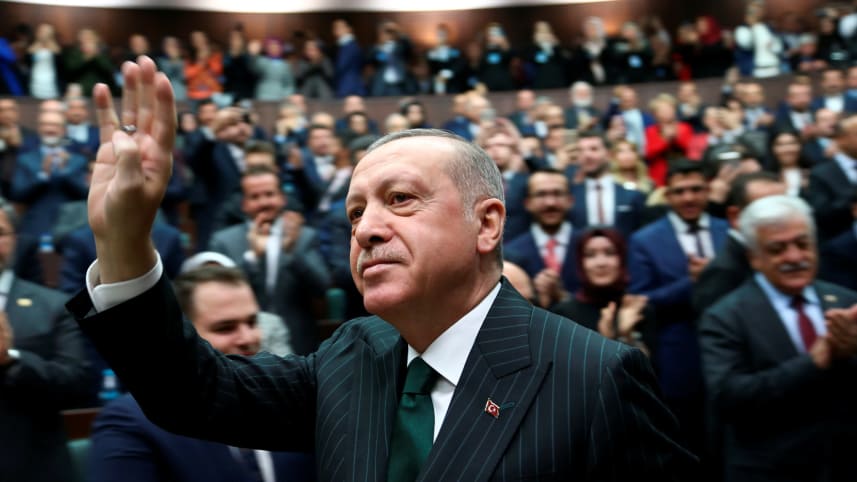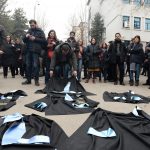With the Turkish media dominated by the government, the walls of buildings have become outlets for free speech, while the crusade against teachers, the media, journalists and authors continues
Sometimes it’s hard to understand why Prime Minister Benjamin Netanyahu and Turkish President Recep Tayyip Erdogan aren’t good friends. Both are more paranoid about domestic political rivals than about external enemies, both despise the free press and both have a common enemy: George Soros, the Hungarian-born Jewish billionaire who supports human rights organizations.
The Turkish human rights activist Osman Kavala was arrested in October 2017 and held on the charge of attempting to upset the constitutional order and attempting to bring down the Turkish government. This is a generic charge that is leveled at anyone suspected of having a connection with the organization of the Muslim Islamic cleric Fethullah Gulen, whom Erdogan blames for the attempted coup in July 2016; or against anyone associated with the mass protests of 2013 against a plan to destroy Gezi Park in Istanbul.
At a meeting that Erdogan held with local leaders last Wednesday, he announced that “one of the financiers of the protest [Kavala] is already in prison, and behind him is the infamous Hungarian Jew George Soros, who sends his people all over the world to divide and topple nations, while using his fortune for that purpose.” For Erdogan, declarations are not enough. Last week, 13 academics were arrested on suspicion of belonging to Gulen’s group.
In addition, the campaign of persecution against officials, teachers and civil servants continues with full force. According to a recent survey among Turkey’s teachers, about 70 percent said that they were afraid of losing their jobs due to the threatening atmosphere imposed by the government on the education system and in over the dismissal of about 41,000 school employees who were among 140,000 civil servants dismissed from their jobs since the unsuccessful coup.
On another occasion, Erdogan complained that Turkey lags behind when it comes to university scientific research and that Turkish citizens read an average of only three to four minutes a day, but watch television for six hours a day. It would interesting to know whether there’s a connection here, since when thousands of lecturers left or were fired from academic institutions, we can assume that their research also ground to a halt. Incidentally, in raising the issue, Erdogan admitted that he doesn’t read books. His aides provide him with summaries. Maybe he hasn’t read Anton Chekhov either.
Not only teachers, but also judges and business people fear the long arm of the regime. Journalists continue to be targets of the Turkish intelligence service despite the fact that of 29 major media outlets, 21 are owned by Erdogan’s associates. The most recent blow was sustained by the newspaper Hurriyet, which was sold in March to the Demiroren conglomerate, which has very close ties to the president.
The difference between the old Hurriyet and the new version was immediately evident with the change in ownership. The critical articles became wishy-washy commentaries, the investigations and exposés disappeared, and the home page of its English edition, Hurriyet Daily News, features cheery articles about vacation spots in Turkey and food and entertainment venues in the country.
As the traditional media outlets toe the line, the walls of buildings fill the void, as graffiti artists paint their protest messages there. One of them is Adekan, the 29-year-old son of a railway worker, who under cover of darkness, paints impressively beautiful graffiti depicting figures of people and animals in vivid colors, symbolizing, in a less than blatant manner, the relationship between the government and the citizenry and between rich and the poor. The symbolism is understood mainly by Turkish intellectuals, but when Adekan draws pigs, there’s no need for much commentary to understand whom he’s referring to.
Critical literature is gradually fading to the point at which even the most famous Turkish writer, Orhan Pamuk, a Nobel Prize laureatefor literature, who was prosecuted in 2006 for his statements regarding the Armenian genocide, refrains from speaking out publicly against the regime. Although the charges against him were dropped following international pressure, mainly from the European Union, Pamuk is still a government target. This year, apparently under Turkish pressure, the city of Sarajevo refrained from granting him honorary citizenship after the honor had already been approved by a committee.
A few years ago, at his own expense, Pamuk built a museum on the European side of Istanbul called the Museum of Innocence, a reference to the title of a novel that he wrote in 2008. The museum displays items representing life in the 1970s. Some of the items are arranged in a way that could imply criticism of the regime. There is, for example, a typewriter above which there is a picture of a boxer, symbolizing the fight against censorship. Like the graffiti art, the museum creates a new critical language that is reminiscent of the artist protests during the Arab Spring in Egypt and Tunisia, where walls became a media outlet. In Turkey, protests of this kind can’t be compared to those in Egypt in terms of quantity, but they are steadily expanding.
With suspicion and persecution prevailing in Turkey, it’s hard to take the declarations of Erdogan and his ministers very seriously regarding the murder of Saudi journalist of Jamal Khashoggi in Istanbul. Last week Turkish Foreign Minister Mevlut Cavusoglu expressed anger at U.S. President Donald Trump, who casually dismissed the conclusions of the CIA, which has concluded that Saudi Crown Prince Mohammed bin Salman was responsible for the murder.
“Trump’s statements amount to him saying ‘I’ll turn a blind eye no matter what,” the foreign minister said. “Money isn’t everything. We must not move away from human values,” Cavusoglu said. But in the same breath, he announced that there is nothing preventing a meeting between Erdogan and the crown prince at the G20 summit at the end of the month in Buenos Aires. Apparently, after all, money is everything.
Source: Haaretz



